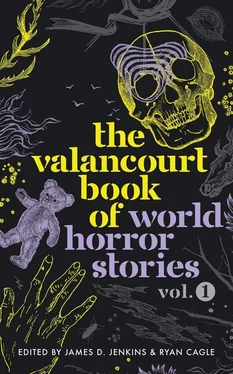I went over to my own large sailboat where it was moored with the sail taken down and the gaff tied to the boom, as is the custom here. It was a spacious but slender sea boat, thirty-two feet long, built for rough and stormy seas. I bent down and pulled a little at the mooring rope. Tightened it, felt the movement in the boat. It answered with some small gurgles from the bow where beneath the nailed boards the dark water lay.
I stood on the wharf for a long time and stared out towards the shiny sea surface that lay there like molten lead, and the stars emerged one by one in the steel-blue heavens.
I was up very early the next morning to get the equipment ready for the trip. A sense of anticipation made my skin tingle as I got dressed. The sun was about to break through the foliage over the forest-clad ridge behind the cottage. I went out on the steps, took a breath of the fresh morning air and saw the harbor far below like a big U, with boats lying along the protruding wharfs.
It was completely silent.
Down at the tavern and the cottages behind it, smoke had begun to emerge from the first chimneys. I took my watch from my pants pocket and flipped open the thin silver cover. Quarter to four. Soon the crews of the lobster boats would set out after their traps. I went in and made breakfast, packed some rations in my bag and pulled out what clothes I had for stormy weather.
The grass was still wet and the air clear and pleasant to inhale after the previous day’s rain. I sang to myself as I walked rather quickly down the slope to the harbor, which the sun had now tinged with a reddish glow.
I had almost reached the wharf, where the large granite rocks meet the planks, when I stopped. In the glistening wet grass to my left, halfway down in a ditch, sat a man. He sat so motionless that he almost blended in with the ground. It was the drunk from the night before at the tavern. He sat and looked straight ahead, didn’t move. He didn’t seem to have seen me. I walked away and stopped above and opposite him so that he could not avoid catching sight of me. He sat with his legs astride, his hands on the ground. I could see that he was as drunk as the night before, if not more so.
‘Hello!’ I called out. He sat totally motionless. I called again, a little louder, ‘Hello!’
It was as if he shivered a little just then, his face tensed up, and he ran his tongue over his lips. Then he saw me.
‘I hear you,’ he said with a tongue that was thick and stiff. His eyes widened and then contracted. ‘I recognize you . . .’ He squinted up at me with dull eyes. ‘And now you’re going to sail to Sybil – to Sybil Point!’ His mouth drew into a twisted grin, his chest heaved as though he were going to vomit, but then I realized he was sitting there laughing, laughing with a hoarse, objectionable sound that quickly turned into a violent cough. My sack had suddenly become heavy to hold, and I let it fall onto the road with a thud. The old man’s breath came out in squeaks between coughs. Then he pointed a bony finger at me and called hoarsely – ‘You’re going to Sybil . . . to Sybil . . . she . . .’
She?
I took a step forward and bent down.
‘What’s that you say, old man? She who?’
His voice grew weak from fatigue, and he tilted his head back as he looked at me and whispered:
‘Sybil . . .’
‘Who is Sybil?’ I said. ‘There’s no one by that name here. Sybil Point is a place.’
He coughed and drew a creaking breath.
‘Beware . . . the cormorants . . .’
His eyes closed again and his voice died away.
I realized I had gotten worked up by what he had said. My blood pulsed faster, and I felt a strange shiver run down my back. I tried to shake him to wake him up. It was useless. He lay there reclining in the wet grass with his legs spread out to the side and his head leaning backward. It was impossible to get any more out of him.
I got up and walked over to the boathouse, where I had hung the sail out to dry. It was rough and thick and I half dragged it with me over the wharf down to the boat. There I secured it. Afterwards I found an old sack in the boathouse, which I laid over the sleeping drunk in the ditch. Then I untied the mooring ropes, set the tiller in place, and rowed the heavy sailboat out of the mooring place and out of the harbor, past the jetty. There I raised the square gaff sail and remained adrift, waiting on the breeze that always comes from the west at that time of day.
After a while it filled the gray-white sail, and the sea began to wash along the bow.
I sat good and deep down in the steering hatch and held the tiller with one hand. I had lashed the mainsail, for now a brisk side wind was blowing that made the craft keel, with the boom and the gaff hanging out over the gunwale. I had brought a bag of apples with my provisions and I picked one up and began to eat.
I could not help thinking again about the old drunkard. It was the second time I had bumped into him, and both times he had talked about Sybil Point. Or rather – hadn’t he talked about a ‘her’? A woman? He had said something else too:
‘Beware . . .’
It goes without saying of course that his mind wasn’t altogether sound.
It had gotten colder, and the fog had drifted in from the sea. I could hardly see land out there.
The sun had traveled half its arc over the sky and hung like a yellow paper disk in the mist, when I noticed that the sail flapped weakly a couple of times and finally hung dead from the gaff. A whirlwind sketched a dark ripple over the sea. I noticed too that the swells had become bigger and stronger. I craned my neck and scouted ahead. Far up ahead, as at the oceanfront, I could see a dark clump formed against the colorless sky, like a knot on the horizon. That had to be it – the cliff.
The sky above me had all at once gone gray and dark like an arched vault. The seagulls, which had followed in my wake since I set out, had disappeared. I looked back. The horizon could no longer be seen. The swells bobbed me up and down like a cork on the sea, and the water was dark and smooth like oil. The wind was totally dead here, and the sail hung heavy and quiet. But I was born and raised on the sea and I knew what that meant.
I locked the rudder and climbed up to the mainsail. I had barely got the halyard lowered when it broke loose. The first gust almost sent me overboard, but I hooked myself securely in the stays as the wind ripped and tore at my clothes, and with rapid movements I made the ropes secure. Then the wind came howling over me.
The little boat tossed wildly, quivering under the violent wind pressure and keeling until the gunwale was all the way down to the water’s surface. The sun had completely disappeared. Breaking waves heaved over the deck, and wind and sea and rain and salt spray were like a violent whirlwind around me. A mighty bolt of lightning ripped the sky into a network of blue fire, larger and more intense than I had ever seen before, and the thunder came almost simultaneously, a deafening bang like God’s own voice, and the whole time the whistling and howling of the wind, which sent the boat like a sliver of wood along the lashing sea. I sat stiff-legged pressed up against the bulkhead and held onto the rudder with all my strength. I was soaking wet and almost breathless from the wind and breaking waves, and the oiled wood of the rudder was wet and slippery. My leg muscles trembled and my arms had begun to cramp.
Then I saw it.
I had gotten there before I had realized it. The boat suddenly careened more than usual, and I saw now that I hadn’t spotted it before because the sail had been in the way the whole time.
Before me rose a giant of a granite block, dark, worn and gnarled by erosion. It went steeply down into the sea opposite me. Down in the foaming surf I could make out sharp and jagged stones that time had broken loose from the cliff wall. The sea was white at the foot of the mountain, and the water broke with a thunderous sound. In a flash I thought about why the pointed stones hadn’t been worn smooth by the water, why they rose like sharp knives towards the sky though they were certainly hundreds of years old, and that was the only thing I had time to think, for suddenly I discovered, with a growing sense of fear, that I was too close – I was far too close!
Читать дальше











